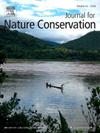Population collapse and habitat loss in the Comoros Flying-Fox after cyclone Chido: Urgent conservation priorities
IF 2.5
3区 环境科学与生态学
Q2 BIODIVERSITY CONSERVATION
引用次数: 0
Abstract
Tropical cyclones represent a significant ecological disturbance with profound implications for insular biodiversity. They have been identified as major drivers of local extirpations and population collapses among Pteropus species on the islands of the Indian Ocean. The passage of Cyclone Chido in December 2024 caused extensive damage to Mayotte’s native forest ecosystems, resulting in significant biodiversity loss. Among the most impacted taxa is the Comoros flying-fox (Pteropus seychellensis comorensis), an important pollinator and seed disperser species whose population on Mayotte, previously the second largest within the Comoros archipelago after that of Grande Comore (Ngazidja), has undergone a dramatic decline, with post-cyclone assessments indicating the presence of only a few dozen surviving individuals. In this study, we identify and propose a set of evidence-based conservation priorities aimed at informing long-term strategies for the recovery and persistence of P. s. comorensis on Mayotte, in the context of increasing climatic variability and anthropogenic pressures.
奇多飓风后科摩罗飞狐的种群崩溃和栖息地丧失:紧急保护优先事项
热带气旋是一种重要的生态干扰,对岛屿生物多样性具有深远的影响。它们已被确定为印度洋岛屿上翼龙物种局部灭绝和种群崩溃的主要驱动因素。2024年12月,飓风“奇多”过境,对马约特的原生森林生态系统造成了广泛破坏,导致生物多样性严重丧失。受影响最严重的分类群是科摩罗飞狐(Pteropus seychellensis comorensis),这是一种重要的传粉者和种子传播者,它在马约特岛上的种群数量急剧下降,之前是科摩罗群岛内仅次于大科摩罗(Ngazidja)的第二大种群,飓风后的评估表明只有几十只幸存的个体。在这项研究中,我们确定并提出了一套基于证据的保护优先事项,旨在为马约特岛p.s. comorensis在气候变化和人为压力日益增加的背景下的恢复和持续提供长期策略。
本文章由计算机程序翻译,如有差异,请以英文原文为准。
求助全文
约1分钟内获得全文
求助全文
来源期刊

Journal for Nature Conservation
环境科学-生态学
CiteScore
3.70
自引率
5.00%
发文量
151
审稿时长
7.9 weeks
期刊介绍:
The Journal for Nature Conservation addresses concepts, methods and techniques for nature conservation. This international and interdisciplinary journal encourages collaboration between scientists and practitioners, including the integration of biodiversity issues with social and economic concepts. Therefore, conceptual, technical and methodological papers, as well as reviews, research papers, and short communications are welcomed from a wide range of disciplines, including theoretical ecology, landscape ecology, restoration ecology, ecological modelling, and others, provided that there is a clear connection and immediate relevance to nature conservation.
Manuscripts without any immediate conservation context, such as inventories, distribution modelling, genetic studies, animal behaviour, plant physiology, will not be considered for this journal; though such data may be useful for conservationists and managers in the future, this is outside of the current scope of the journal.
 求助内容:
求助内容: 应助结果提醒方式:
应助结果提醒方式:


